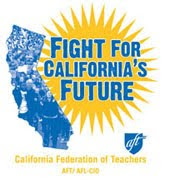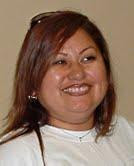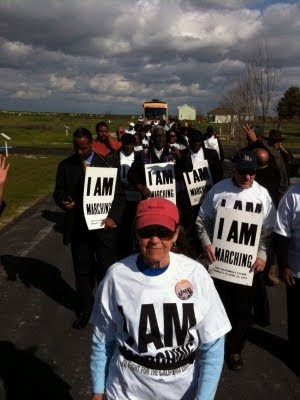 The article below was written by David Bacon, associate editor at Pacific News Service. Bacon is the author of several books on immigration, most recently Illegal People: How Globalization Creates Migration and Criminalizes Immigrants (Beacon). The article appeared in the national publication The Nation on 17 March 2010. It's rewarding to receive this national attention!
The article below was written by David Bacon, associate editor at Pacific News Service. Bacon is the author of several books on immigration, most recently Illegal People: How Globalization Creates Migration and Criminalizes Immigrants (Beacon). The article appeared in the national publication The Nation on 17 March 2010. It's rewarding to receive this national attention!===========================================
Californians March into the Heartland By David Bacon
March 17, 2010
Shafter, CA
As the March for California's Future left Bakersfield, marchers trudged past almond trees just breaking into their spring blooms. From Shafter and Wasco across dozens of miles to the west, white and pink petals have turned the ground rosy, while branches overhead are dusted with the delicate green of new leaves.
The San Joaquin Valley's width--over seventy-five miles at its widest point--is even more impressive than its length, as it stretches several hundred miles from the Tehachapi Mountains in the south overlooking Bakersfield to the delta of the San Joaquin and Sacramento Rivers in the north. In the heart of that delta lies Sacramento, the state's capital and the marchers' goal.
This immense space is filled with almond orchards, grape vineyards, dairies, and alfalfa and cotton fields. A myriad of crops, grown on a huge industrial scale, make obvious the historical source of the state's wealth. For almost two centuries, that wealth has located California's political center here. The conservatism of the valley's political and economic establishment has been the main obstacle to the growth of progressive politics, which long ago shaped the coastal metropolises of San Francisco and Los Angeles. For decades growers succeeded in preventing rural industrialization, for fear it would bring unions and higher wages. Even mass housing was discouraged, until the corporations that own the land realized that the profits of development rivaled those of grapes and pears.
The March for California's Future is challenging that power, and the stranglehold it still exerts over the state. Holding the budget hostage while California unemployment tops 12 percent, growers and their political allies here have slashed the funding for schools and social service. Now teachers, homecare workers and those who depend on public services are walking into the growers' front yard, defying the past.
When cotton was king and thousands of workers were still needed to bring in the harvest, immigrants and Dust Bowl refugees rose in rebellion in 1933. The Associated Farmers kept the valley under virtual martial law, while growers gunned down strikers in front of the sheriffs' station in Pixley, a town along the march's route. In the '60s the United Farm Workers was born in another town on the marchers' way--Delano. The UFW's most implacable enemies were always here--the San Joaquin grape growers, and the politicians who protected their crops, their water, their cheap labor and their profits.
Valley Republicans are still mounting the watchtowers along that same wall of protection. Two brothers, Tom and Bill Berryhill, represent adjacent districts in the state assembly. Tom, a fourth-generation farmer, lives in Modesto, home of the Gallo wine empire. Bill, who represents Ceres, sits on the board of the Allied Grape Growers. Both inherited their membership in the political class here from their father, legendary Republican legislator Clare Berryhill.
Today Valley Republicans are a primary obstacle to the passage of a budget that would continue to fund basic services for Californians, especially schools and healthcare. The state has a requirement that two-thirds of the legislature approve any budget. Even more important, any tax increase takes a two-thirds vote as well. So even though urban Democrats have had a majority for years in both chambers, a solid Republican block can keep the state in a continual economic crisis until Democrats agree to slash spending. With huge deficits from declining tax revenues, and a recession boosting state unemployment to over 10 percent, converting a budgetary crisis into a political one is not difficult.
Ironically, nowhere is unemployment higher than in California's rural counties, often twice as high as on the coast. Small agricultural towns like Shafter and Delano are filled with workers who can't find jobs, while at the same time budget cuts reduce the social services for unemployed families and shower teachers in the local schools with pink slips.
Bill Berryhill bemoans that Stockton's schools have just sent out 192 layoff notices. But turning reality on its head, the budget cuts demanded by the Berryhills and their colleagues are not responsible, they say. The culprits are taxes and regulations on business. "While the state flirts with tax increases, our agricultural, trucking and educational sectors continue to decline," he says. "Since I first arrived at the capital fourteen months ago, I have been shocked to see the barrage of misguided proposals for tax increases, fee hikes and more regulations on families and job creators. We already pay some of the highest taxes in the nation, including gas and sales taxes, and yet some lawmakers want us to pay more."
One of their political allies is Jeff Denham, a state senator whose district not only includes a large chunk of the San Joaquin Valley but stretches across the mountains to the neighboring Salinas Valley, fondly referred to by agribusiness as "the nation's salad bowl." Denham gets an A+ rating from the Howard Jarvis Taxpayer Association (architects of the tax-cutting policy that is driving the state into astronomical debt) and a perfect score from the California Taxpayers Association. Denham also owns Denham Plastics, which makes those plastic clamshells farm workers pack with strawberries out in the fields. His family also owns many of the almond trees breaking into bud as the marchers walk by.
Behind these legislators are not only the other growers they see out on the golf links but the most extreme element of the state's Republican Party, a group far to the right in almost anyone's book. California's Republican Party is now dominated by the California Republican Assembly, which gave the Berryhills 67 percent ratings. Abel Maldonado, a Republican who voted for the budget last session, got 22 percent, lower than some Democrats. The Stanislaus County GOP lists its principles as "smaller government, lower taxes, individual freedom, strong national security, respect for the sanctity of life, traditional marriage, the importance of family and the exceptionalism of America."
"If government quit draining economic life blood in excess taxes and quit meddling in the private sector's affairs, economic recovery would be sooner and smoother," editorializes the Orange County Register. "Instead, even in the face of public opposition, government arrogantly looks for creative new ways to part Californians from their money and for presumptuous schemes to show businesses how to do business.... the private sector can overcome California's economic problems just fine without government's intrusive and counterproductive 'help.' More taxes and more programs aren't needed."
That's who the marchers are saving California's future from. And their plan? Take the anger of the youth protests over the impact of the budget cuts on education right to the door of the Berryhills, Denham and their golf partners. Their march will take forty-eight days, as it winds through the small towns that send those politicians to Sacramento.
San Diego community college teacher and marcher Jim Miller has observed the severity of the crisis most clearly in education. "Over $8 billion has been cut from education in the last year, in San Diego alone $52 million," he says. "Statewide we're serving over 200,000 students we're not being funded for. We've had to lay off scores of part-time instructors. My job is to serve our students and I'm unable to. Community colleges are the most accessible door of opportunity for working class students and particularly communities of color. We're witnessing the destruction of the California dream in education."
But Miller is also proud that the demands of the march go beyond education, to "fighting for an economy and a government that works for everybody. We're not saying save education by throwing old people out of their homecare, by getting rid of healthcare for poor kids, by closing down state parks or privatizing prisons. This is about the future of the state of California." Without such unity, he says, "we'll see a scarcity model, where people say take someone else's piece of the pie, not mine. That's a race to the bottom."
Doug Moore, another marcher, is executive director of United Domestic Workers Local 3930. He emphasizes that in small San Joaquin Valley towns, the budget cuts on the table in Sacramento could even lead to the elimination of home care itself. "Statewide there are 127,000 nursing home beds, but only 20,000 available. So where are people going to go? In California we have record unemployment already. Now you're talking about another 350,000 people going on benefits. The governor's budget solution is not a solution. It's a disaster."
Governor Arnold Schwarzenegger earns Moore's ire because, although he distances himself from hard-right Republicans in the media, he carries their antitax, budget-cutting program in the capitol. It takes a two-thirds vote to override his veto, so his alliance with Republican legislators allows them to dictate that budgets can only be based on slashing spending, not on new revenues.
The UDW intends to use the march to strengthen its relationships with voters in an area of California with a very conservative image. "People in the communities we're walking through will be supportive if we build relationships," Moore predicts. "Whether you're conservative or not, you're hurting because of the decisions the governor and some of the legislators are making. As we walk through, if we're registering people to vote, educating them on the issues at hand, organizing town hall meetings to hold elected officials accountable, we'll have an impact."
The march was originally proposed by a group of activists and local union leaders in the California Federation of Teachers. Miller, who was deeply involved in those discussions, saw it as an outgrowth of the wave of student protests that has greeted budget cuts and fee hikes in education. That student ferment led to a proposal to boycott classes and mount demonstrations on March 4, in a statewide Day of Action to save education. The March for California's Future was then scheduled to kick off from a rally in Los Angeles, followed the next day by another in Bakersfield, at the southern foot of the San Joaquin Valley. When March 4 arrived, demonstrations and marches swept the state. The entire UC campus in Santa Cruz was closed when students blocked its two access roads.
"The LA rally was spectacular," Miller enthused. "The church holds a thousand, and there were hundreds more trying to get in. In Bakersfield, people were waving from their houses and came out and joined--I don't think that's something that happens much there." Miller counted 565 people who came from San Diego to the Los Angeles event, including three busses of students from San Diego Community College, where he teaches.
At the Bakersfield kickoff, teachers and students marching to the Martin Luther King Jr. Park were joined by a huge contingent of home care workers, mobilized by UDW. "As inspiring as March 4 was, though, it was a one-day thing," cautions Miller. "I hope this march is a way to take a seven-week approach, a long sustained conversation with the people of the state of California, trying to raise the most difficult issues. Like, we've got to raise revenue someplace. If we don't raise revenue, we're at the point where the choices are stark. We've got to do something to address the two-thirds majority rule. If we don't do it, we're going to be in permanent gridlock."
For his part, Moore credits the CFT "for taking a bold step and then reaching out and saying, 'we need other people.' If they hadn't taken that step, we'd all probably be working the same way we always have, in our silos. And what you see on the march here is, no silos. This isn't just about public education; it's about public services and a fair tax system. As long as we stick to that, this coalition will grow."
Miller agrees. "We want to save the entire social contract in the state," he explains. "What's inspiring people is that different unions, different communities are talking to each other, in a shared struggle against the decimation of the future of the vast majority of people."
Officially, the union and other march organizers have adopted three goals:
Restore the promise of public education;
A government and economy that work for all Californians;
Fair tax and budget policies to fund California's future.
Already State Assemblymember Alberto Torrico has introduced a bill that would require state tax officials to impose an oil severance tax and use the proceeds for education. California is the only major oil-producing state in the nation without one. Predictably, state Republicans have rejected the proposal. Another effort is underway to collect signatures for a ballot initiative to remove the two-thirds requirement for passing a budget. That idea is spreading widely on college campuses in the wake of the March 4 actions.
Both Moore and Miller feel personally motivated to march, in addition to their larger political goals. "One of my sons is a school teacher who just got his pink slip," Moore says. "I have a daughter who's a senior at San Diego State, and she participated in the actions there. She needed a particular class to graduate in May and that class was eliminated. They know I'm walking and they love it. I'm doing it for them."
Back in San Diego, Miller's wife, Kelly Mayhew, also a teacher at City College, has taken over part of his teaching load, and the full parenting responsibilities for their son. But "as soon as Jim came and told me about the idea, I was sold on it immediately," she says. "People aren't really awake to the long-term consequences of these budget cuts. A whole generation of kids is going to be pushed out of our educational system. And as teachers, we're so often good at making do with less." "She was very emotional when I left," Miller recalls. "That part of it's hard. And of course I'm 44 years old, soon to be 45, with a bad back and asthma, so it's probably not the best time in my life to choose to walk 260 miles. But really in the big picture, it's a small sacrifice in comparison to what's at stake."
Delano, birthplace of the farm workers union and heart of San Joaquin Valley agriculture, now has two prisons and a jail. More of the town's permanent residents probably work as guards than in the fields. But so far, the response from local people has been very supportive, Miller and Moore agree. "Even here, in one of the most desolate stretches, cars are honking their support," Miller says. "I thought we might get some of the right-wing backlash--tea baggers giving us the bird out the window--but I haven't seen any of that.
"Really, someone has to do something," he says. "Personal sacrifice can help us demonstrate the importance of our message. Sometimes you have to lead by example. I can't ask someone to do something I'm not willing to do myself. And I'm convinced that if we just do what we always do, we're certain to lose. We need to capture peoples' imagination, and find an affirmative form of struggle."
Most of all, Miller is proud of the impact the events of recent weeks have had on his own students. "They're educating themselves," he enthuses. "They have a remarkable understanding of what's going on. It's inspiring to see how sharp they've become on arcane matters, like split roll tax and oil extraction tax. As bad as the situation is, that's a hopeful sign I think."
















 Editor's Note: This is the route the marchers are taking on their way to Sacramento - click on the map to enlarge it.
Editor's Note: This is the route the marchers are taking on their way to Sacramento - click on the map to enlarge it.
